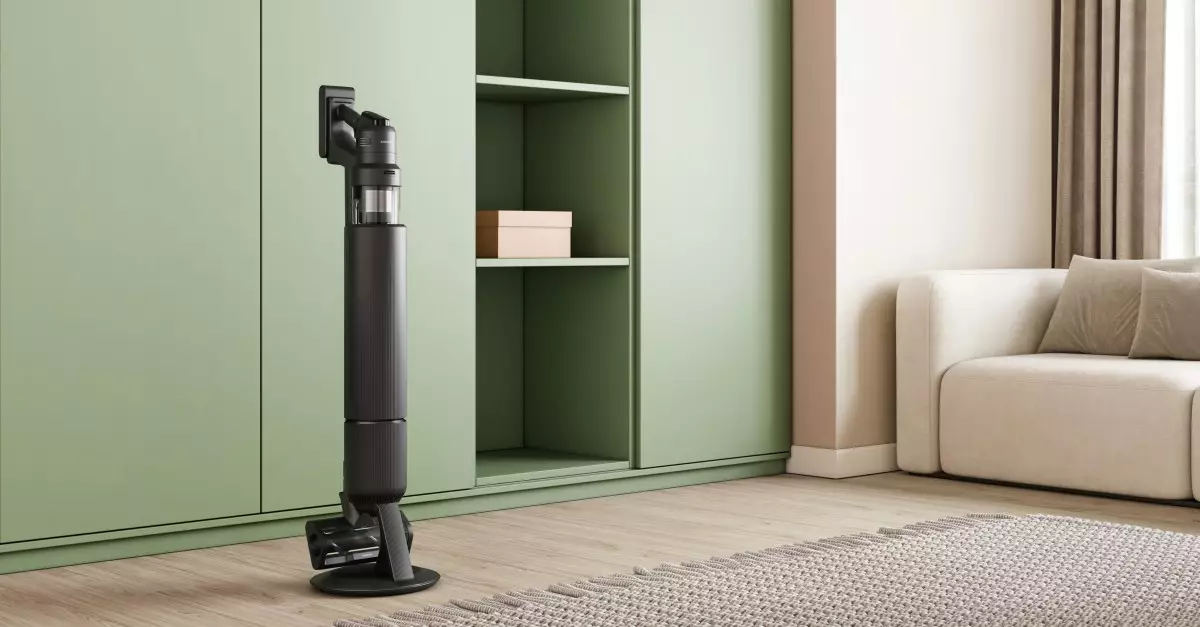The advent of smart technology has revolutionized many aspects of our daily lives, and the household is no exception. At the forefront of this evolution is Samsung, a company that continually blurs the lines between convenience and complexity in the smart home arena. Their latest offerings, including the Bespoke Jet AI vacuum and AI Laundry Vented Combo washer/dryer, illustrate both the immense potential of smart home technology and the trepidation that accompanies it. While these appliances aim to streamline our routines, they raise vital questions about functionality, practicality, and user experience in our increasingly connected lives.
Innovative Features with a Price Tag
Samsung’s Bespoke Jet AI vacuum is priced at a considerable $1,099, but what do users get for this investment? A sleek, user-friendly LCD display connected to your smartphone promises to keep you informed about incoming calls and messages while you tackle household chores. This feature, while undoubtedly enticing, also necessitates a Samsung account and the SmartThings app, potentially alienating users who are not deeply embedded in the Samsung ecosystem. This raises an essential conversation about accessibility in smart home technology: is ease of use sacrificed for advanced features?
Furthermore, the AI Laundry Vented Combo washer/dryer impresses with an array of automated functions. Not only can it detect the correct amount of detergent needed, but it can also participate in phone calls via its 7-inch touchscreen. However, isn’t it slightly absurd to consider that doing laundry now involves answering calls from an appliance? The utility must be balanced with logic. In our quest for convenience, we run the risk of integrating smart technology into every facet of our lives, potentially causing us to become more distracted rather than less.
Integration and Interactivity: A Double-Edged Sword
Samsung’s commitment to enhancing user experience through interconnected devices is commendable. By allowing homeowners to control various aspects of their smart appliances — from checking the weather on their refrigerator to answering a video doorbell while handling laundry — Samsung embodies the idea of a fully integrated smart home. However, does this interactivity fulfill a genuine need, or is it merely a response to market competition and consumer hype?
While the AI Home control panels add undeniably cool features, there is also a nagging worry about complexity. Adding a touchscreen to every appliance may seem like a modern marvel, yet it could lead to frustration when the technology fails. Unlike traditional knobs and buttons, which may possess a certain durability, screens are far more vulnerable to damage and malfunction. Furthermore, cluttering our homes with touchscreens evokes concerns about obsolescence. Many consumers are understandably hesitant to invest heavily in technology that could become outdated rather quickly.
Smart Technology: A Source of Concern
Another concern that arises in the age of smart technology is the risk of unwanted commercialization. While Samsung has yet to introduce advertising on its appliance screens, the potential for this practice looms ominously. In an industry already rife with data collection and privacy issues, integrating ad space into domestic technology could feel like an unwelcome invasion into our homes — transforming our sanctuary into a billboard.
Moreover, as we increasingly rely on technology to manage our lives, the implications for human interaction and experiences are profound. There’s a fine line between convenience and a loss of connection with our surroundings. As we stand in our beautifully appointed kitchens staring at a screen for recipe instructions, will we miss the simple joy of cooking alongside a loved one?
The Bigger Picture: Rethinking Smart Appliances
It’s essential to take a step back and consider the broader implications of smart appliances. While they promise to save us time and make our lives simpler, we must question whether they are genuinely fulfilling this promise or contributing to a society that is more distracted and dependent on technology. As we cherish the idea of a smart home, it may be time to assess which innovations genuinely bring value and ease, and which technology is merely embellishment that complicates our lives.
The landscape of household technology is undeniably thrilling, yet fraught with complexities. Products like Samsung’s Bespoke Jet AI and AI Laundry Vented Combo washer/dryer may herald a bold new era of smart living, but whether they enhance daily life or add unnecessary congestion remains to be seen. The discussion surrounding the integration of technology in our homes must continue, encouraging manufacturers to prioritize genuine convenience over mere novelty.

